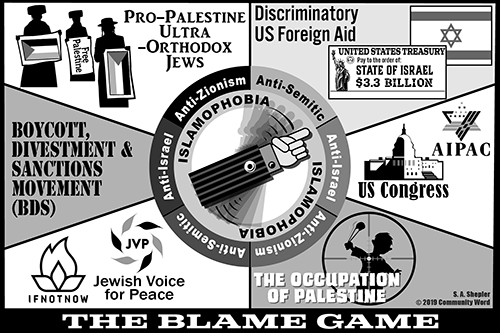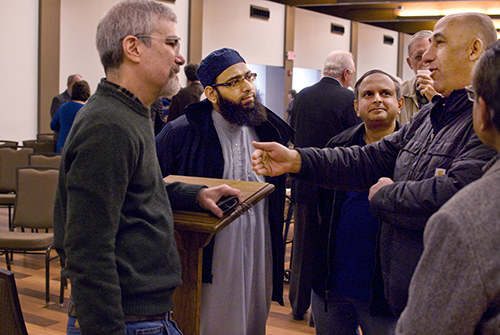
Rabbi Brant Rosen is a scholar who has patience, empathy and courage in his activism for Palestinian people and social justice.
He proves it is possible to love Israel and the Jewish faith and protest human rights violations in Gaza.
Rosen spoke in Peoria recently of his personal and professional understanding of the Israeli-Palestinian situation not in terms of a “conflict” among equal powers but in terms of “oppression” and violation of basic human rights.
His message is laced with the pain of deep personal wounds and disagreements with friends and family.
“I have always been progressive, but my feelings about this issue have evolved,” he said during a presentation at the Life Together Center, First Federated Church, 3601 N. Sheridan Road.

Following his presentation about human rights violations in Gaza, Rabbi Brant Rosen, left, is encircled by members of Peoria’s Muslim community who are expressing appreciation for his support for Palestinians and for his remarks denouncing rising Islamophobia. Rosen responded and conveyed his sympathy and solidarity in the wake of the mass murder of Muslim worshippers at two New Zealand mosques. (PHOTO BY CLARE HOWARD)
Rosen said more young American Jews are pushing back against the notion that any criticism of Israeli policy is anti-Semitic. He cited the movements “If Not Now” and “Jewish Voices for Peace.”
He calls the situation in Gaza “state violence against a minority” when two million impoverished people are confined to a small strip of land and bombarded with sophisticated weapons purchased with massive American financial assistance.
In fact, U.S. military aid to Israel is currently about $3.3 billion a year – more than the military aid the United States provides to the entire rest of the world.
Rosen remained in his Chicago area congregation for 10 years but came to believe he should resign because some of his congregants found his beliefs too painful.
As a Jewish American, Rosen has family in Israel and a poignant, embodied understanding of the horrors of the Holocaust. But he said the basic tenet of Judaism is to stand up for the oppressed.
During and following World War II, many Jewish refugees could not find a country, including the United States, to offer them asylum even after the world was forced to acknowledge six million Jews were killed during the Holocaust in an act of genocide. Clearly, Jewish people needed their own nation, but Rosen now finds myths in the Zionist narrative of a war for independence.
Ongoing violence in Gaza is “corrupting to the Jewish soul,” he said.
Rosen wrote “Wrestling in the Daylight,” a book about the Israel-Palestine crisis. He also writes a blog, Shalom Rav.
He is now Midwest regional director with the American Friends Service Committee, a Quaker peace and social justice group that since 1948 has been advocating “Principles for a Just and Lasting Peace in Palestine and Israel.” The group encourages support for B.D.S., a movement aimed to rally support for boycotts, divestment and sanctions to pressure Israel over its position against Palestinians.
Debate about the Israeli-Palestinian situation is expected to roil into the 2020 U.S. presidential elections. Donald Trump labels Democrats anti-Semitic if they express sympathy for the plight of Palestinians.
The fact is Democrats are unified in opposition to anti-Semitism, but they are divided about Israeli settlements in the West Bank, unequal status for Palestinians living in Israel and regular military strikes against Palestinians in Gaza.
In Congress, dissention erupted over a Tweet from Minnesota freshman Rep. Ilhan Omar. She questioned the grip of Aipac, the American Israel Public Affairs Committee, over legislators. “It’s all about the Benjamins,” she wrote, and later apologized if some people thought there was an anti-Semitic trope in her meaning.
Rosen said he had no doubt in his mind that she did not intend the comment to be anti-Semitic.
“Her statement was about the lobby and its undo influence, I have no doubt,” he said. “She is Muslim, a woman, wears a hijab and is a woman of color. She was targeted. This is racist and Islamophobic.”
He praised legislation proposed by Congresswoman Betty McCollum of Minnesota opposing Israeli detention of Palestinian children.
Rosen said western media tends to portray Palestinian protesters as violent and fanatical.
“Oppress people long enough, and they will fight back,” he said.
Discussions about Israeli-Palestinian policy are difficult. Avoiding these discussions may seem wise, but Rosen urges people to delve into these topics. This is oppression, he contends. Study and speak about the issue.
Rosen recently returned from a trip to Guatemala and found similarities between poverty and desperation there and among Palestinians in Gaza.
Building an interfaith movement for justice is part of the solution, Rosen believes, but that means people must be willing to engage in discussions that are difficult, painful and emotional.
Anti-Semitism is wrong and a gut-wrenching example of egregious inhumanity. Human rights violations are wrong and pollute the human soul.
Rosen said, “This is a terrible, ongoing human tragedy.”
This is happening on our watch. If we are silent, we are complicit.

Recent Comments